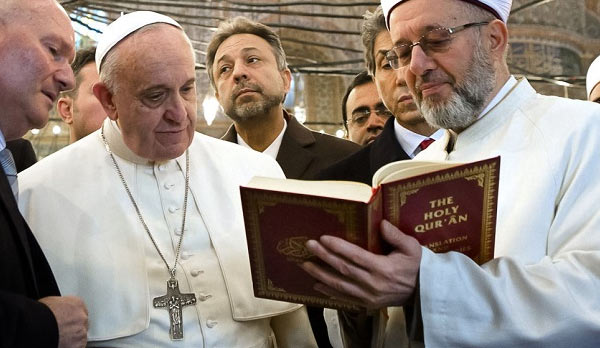As Europe turns into Eurabia, Pope Francis is picking up honors and awards from progressives, including, hilariously, the 2016 “Charlemagne Prize” for his Islamic apologetics. It is hard to imagine a Christian leader less like Charlemagne. Pope Francis is energized not depressed by the disappearance of Christian Europe. “States must be secular,” he told La Croix. Christian states, he said, “end badly” and go “against the grain of history.” He added that “when I hear talk of the Christian roots of Europe, I sometimes dread the tone, which can seem triumphalist or even vengeful.” It also takes on “colonialist overtones,” he complained.. . . Francis’s fawning media courtiers are already rolling out the propaganda for it, predicting that it will “build bridges to moderate Islam.”
A main reason for the trip is to try to strengthen relations with the 1,000-year-old Azhar center that were cut by the Muslim side in 2011 over what it said were repeated insults of Islam by Francis’s predecessor, Pope Benedict.
• • • •
Also in my morning’s mail was a note from Frank Hesperado reminding me of Magdi Allam, the Italian journalist who had publicly converted from Islam to Catholicism. He was baptized by Benedict on Easter Sunday, 2008, the event accompanied by much publicity. Five years later, Allam remained Christian but put Catholicism behind him in dismay over Francis’ “legitimization of Islam and consequently the de-legitimization of Christianity.”
The second reason is what Allam calls “the ideology of globalism which results in promoting a substantially centralized and authoritarian new world order, which overpowers up to the point of erasing national identities and autonomous communities.”
The third is the “ideology of ‘do-goodism’ that compels us to give priority to the claims of others rather than the legitimate protection of one’s own good, resulting, in particular, in immigrationism, which forces us to welcome immigrants regardless of the consequences in our lives.
Note the word immigrationism. It does not refer to immigration per se. Rather, it indicates an ideology which discounts living realities in favor of a utopian chimera of universal benevolence and the ultimate reconciliation of disparate cultures.
• • • •
How did Christian peoples and states, some with powerful armies and the richest cultures of their times, collapse when faced with the onslaught of jihad and dhimmitude from the seventh to the fifteenth centuries? Now I no longer ask myself this question. The breakdown process that I sued to study and documented in old chronicles I have seen taking place in today’s Europe. When I examined the past I saw it repeated in the present, under my very eyes. Indeed, the present situation is reminiscent of the one that followed the Muslim conquests.
. . . The fight against Israel, inherent in the choice of Palestine, provided the basis for the erection of Eurabia. This ideology determined the denial of jihad and encouraged the self-destructive policies of moral and ideological Islamization within Europe.
It was Bat Ye’or who first introduced the word dhimmitude. It is the keystone of her scholarship:
The history of dhimmitude . . . is a taboo subject in Europe today. This is because Muslim states refuse to take responsibility for their history of imperialisim, colonization, enslavement, and oppression, unlike European and American historians and politicians who acknowledge the dark pages of their past.
She emphasizes repeatedly that concepts of war, peace, and justice do not have the same meaning in Islamic states as they do in Judeo-Christian civilizations:
Non-Muslims who obstruct the Islamization of their nations are the aggressors. They are to blame for the wars caused by their opposition to Muslim conquest.
In Jorge Bergolio, we have a dhimmi on the Chair of Peter for the first time in history. We misunderstand the intention of the “gates of hell” trope if we take it as a promise that St. Peter’s will never suffer the fate of the Hagia Sophia.





